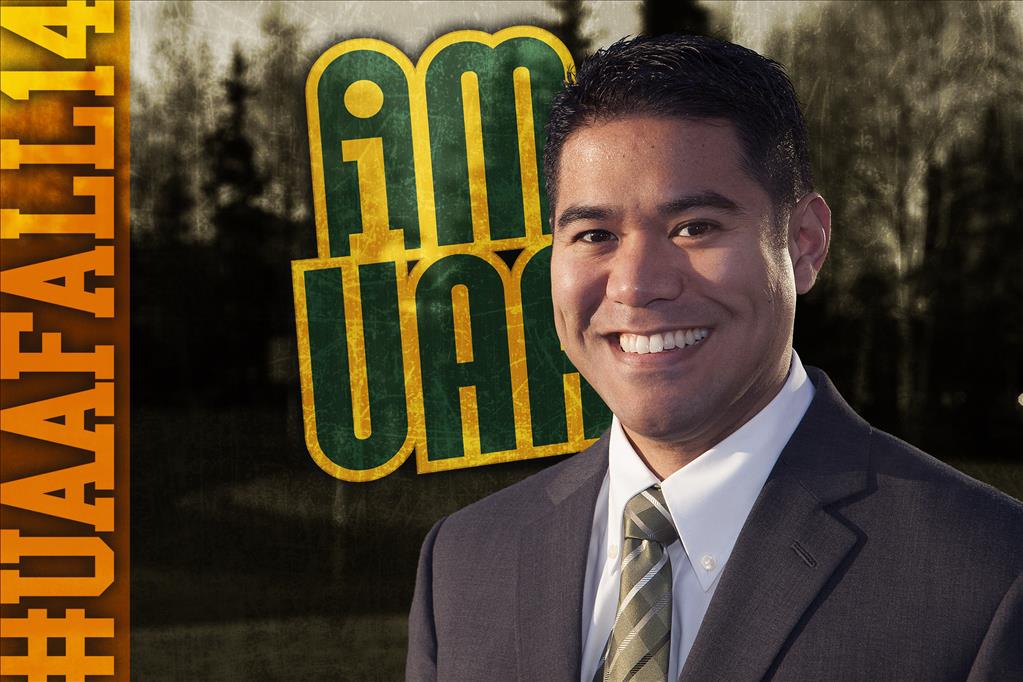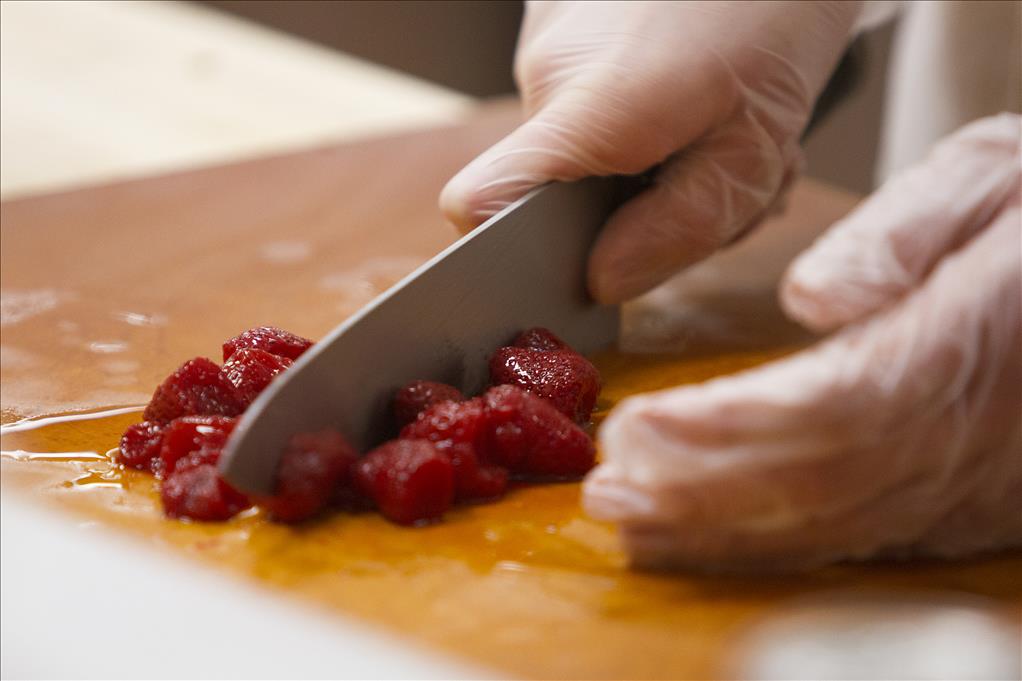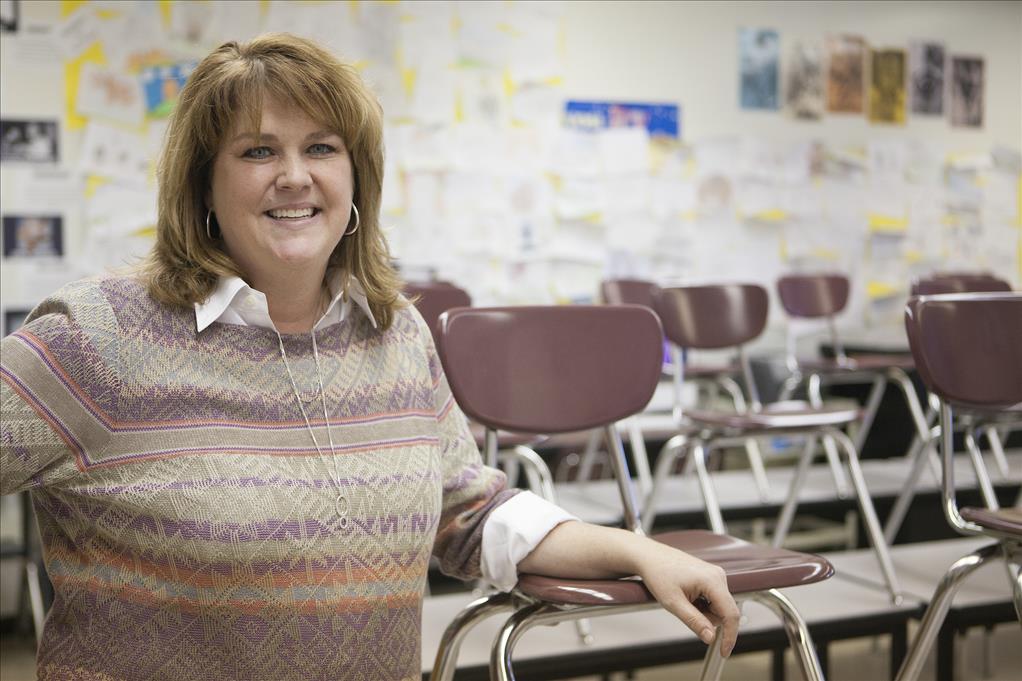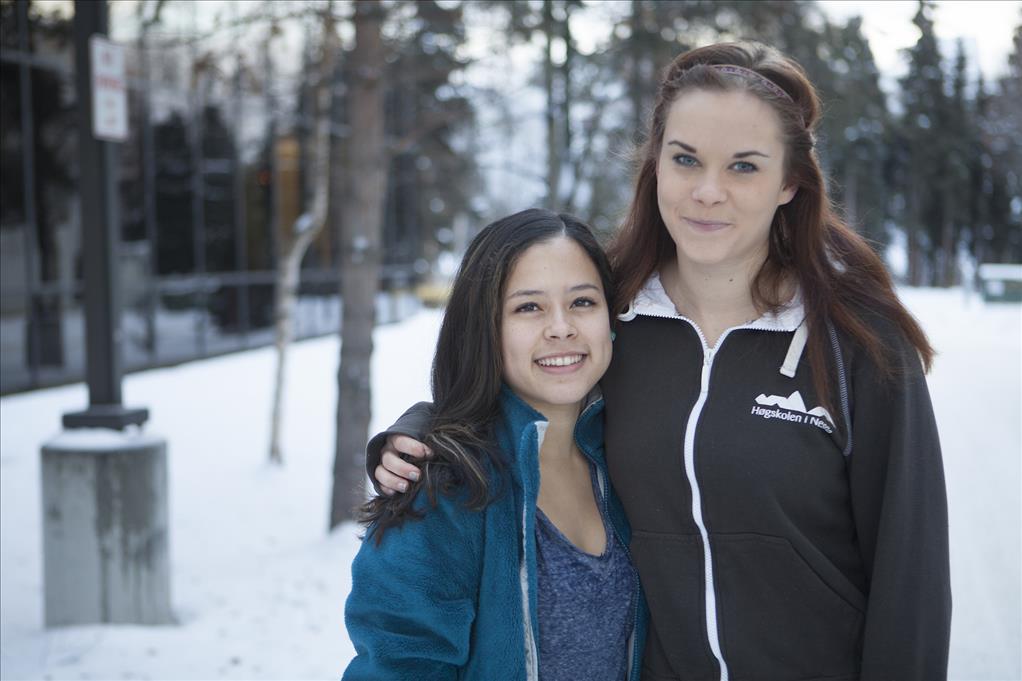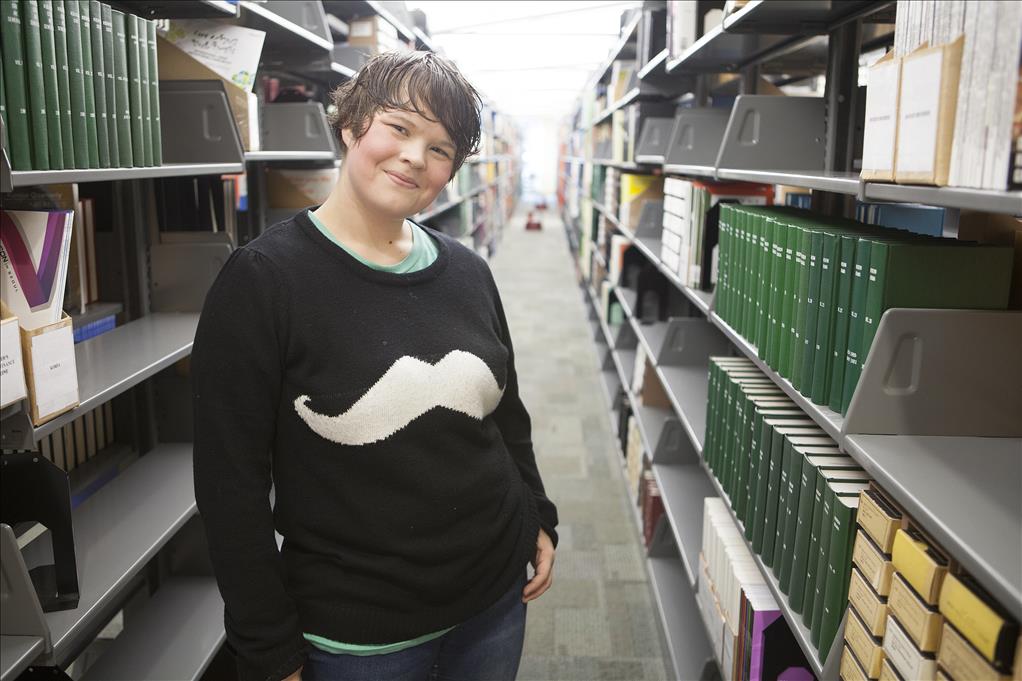UAA student veteran: 'You want what's best for the team'
by Tracy Kalytiak |

Bryan Box, president of Student Veterans of UAA, captured this sunset over the Bermel Valley from the south tower of combat outpost Malekshay during one of his two deployments to Afghanistan. (Photo courtesy of Bryan Box)
Army Specialist Bryan Box served five years, eight months and four days in the U.S. Army, with 775 of those days spent in Eastern Afghanistan, where his Airborne Cavalry Troop patrolled, sat in guard towers and occasionally pummeled Taliban forces with everything from a light machine gun to guided bombs dropped from coalition aircraft.
He served with the vaunted 173rd Airborne Brigade Combat Team, and, in one engagement, watched his commanders order the use of 17 2,000-pound guided bombs to annihilate enemy positions along a six-mile ridgeline.

Bryan Box serves as president of Student Veterans of UAA. He served in Afghanistan from 2007-2010. (Photo by Philip Hall/University of Alaska Anchorage)
"I've got fricking mild traumatic brain injury from blast shockwaves, memory loss, a battered leg from a bad jump," said Box, president of Student Veterans of UAA. "The thing is, I wouldn't trade anything for the world. I actually did something with my life."
Box, who says he was ranked 387 out of 387 students who passed in his high school class-"Everybody below me failed and had to take the 12th grade again"-is halfway through his quest for a bachelor's degree in biology with a double minor in chemistry and physics.
Box loves hunting, fishing and pack rafting, some of the reasons why he moved to Alaska with a friend in June 2011 after two deployments in Afghanistan and 15 months in Germany. He enrolled that fall at UAA.
His friend chose to explore geomatics; Box decided to study biology.
"Biology's everywhere in Alaska," he said. "There's a bunch of critters to study."
Crafting a life of science, service
Veterans are UAA's largest bloc of students, Box said. There are now 2,100 veterans enrolled here, accounting for 14 percent of the university's enrollment.

Bryan Box photographed these soldiers on a ridge near Tana Kalay, Afghanistan, while walking back to their patrol base. (Photo courtesy of Bryan Box)
Shortly after he arrived on campus in 2011, Box saw a Student Veterans of UAA flier posted in the Spine and went to a meeting. Four people were there and elected Box to be secretary for 2011-2012. He served as vice president in 2013 and became president in January. He and another SVUAA member, Doug Bowers, rebuilt the club after many of its members graduated last year, focusing its efforts on camaraderie and public service. One Friday, the group helped feed homeless vets. Another activity, the following day, focused on providing a fun Halloween for children.
"It's time to install term limits," Box said. "I have to focus on my chemistry and physics minors next semester."
When he's not studying science in class, Box uses science in his art. He projected onto a sheet of plywood an image of soldiers he'd photographed on a Pakistani-border ridgeline as they walked back to their patrol base near Tana Kalay. Then, he hot-glued shell casings onto the wood, in the shape of the image.
"This became the printing plate," he said. "Next, I laid a piece of linen over the plate and applied a vinegar solution."
Box covered it with a tarp and dumped about 500 pounds of sand on it, to press the linen into the steel, and left it for 36 hours to let the reaction progress to completion.

Bryan Box used "useless" shell casings to create a piece of art inspired by a photo he took while serving in Afghanistan. (Photo courtesy of Bryan Box)
The 4-by-8-foot creation was featured in the "Service Before Self" charity art auction Sept. 11 at the Alaska Airlines Center, in a display honoring military personnel and first responders. Auction proceeds benefited Alaska's Healing Hearts and Dollars for Dogs.
"Today, hundreds of thousands of soldiers, sailors, airmen, Coast Guardsmen and Marines, who, by the military's measure are 'spent' and 'useless' for future combat operations due to physical, mental and moral injuries are being put to new purpose through the G.I. Bill," Box wrote in a narrative accompanying that piece of art. "By doing so, America is repurposing her warfighters to become the captains of industry, science and innovation that she will need to be as triumphant in peace as they were on the battlefields of Southwest Asia."
Continuing a family tradition
Box, who grew up in western Massachusetts, said he would have been born in Kodiak if his mother hadn't had to retire in 1982 from the Coast Guard because of rheumatoid arthritis, after recovering from an accident.
"She was running a rescue boat when a rogue wave slammed her into the engine block back first," Box said. His father, also in the Coast Guard, retired the same year.
Box says he joined the Army just days after graduating from high school, near Pensacola, Fla.
One reason, he said, was because of his family's tradition of service stretching back to the 18th century.
He remembers the other moment that energized his resolve to serve. Box was making burgers at a McDonald's in 2003 when the manager told him to turn on the TV and he saw soldiers of the Third Infantry Division's Sledgehammer Brigade storming into Iraq.
"I thought, I can't just let this happen," he said. "I can't let someone else fight for me."
He talked with a recruiter and said he wanted to be a cavalry scout in a mechanized cavalry unit.
"I wanted to run Bradley fighting vehicles," he said. "I wanted to hunt tanks."
Box finished high school, lost 40 pounds, pulled up his grade-point average and, in October 2005, finished basic and scout training. Then, he joined the 173rd Airborne Brigade, even though he was "kind of scared of heights."
He arrived in Afghanistan in 2007. During his time there, Box saw what an 80-pound charge sealed in a pressure cooker buried two feet deep could do to an armored vehicle-and the people inside. He saw ferocious amounts of violence on that first deployment, and shattered his leg during an airborne operation a few months after returning to Germany.
Box was supposed to return to his mother's home in Athens, Ga., in October 2009.
On his last day, he learned he'd be staying in Afghanistan for another 16 months.
"When we ended up leaving, it had gotten to the point where we were so nonchalant about being under attack, that we had guys in the unit that just wouldn't take cover," he said. "You'd see rounds just sparking off the rocks all around them and they'd just stand there and fight. But dudes that do that, it's not really invincibility. It's more like, 'I don't care anymore.' Fifteen-month deployments can be really hard on some people. I'm just really glad the bad guys couldn't hit the broad side of a barn."
Finding a silver lining
Afghanistan gave him rewarding experiences as well as hellish ones, Box said. "I may be crippled, but I got crippled for a reason," he said. "I would have preferred not to be, but I got to do a bunch of cool stuff for my country. The thing I was most proud about was the girls' school my red platoon ended up building in Baraki Barak. It wasn't anything big time, it was just teaching the girls how to sew and cook."

Jenna Brooks and Bryan Box stand by Box's "Into the Abyss" artwork, which he displayed in the Sept. 11 "Service Before Self" art auction. The piece is still available for display, he says. (Photo courtesy of Bryan Box)
He said that school was the first step toward creating an actual elementary school for women, to combat the Taliban's desire to subjugate women and girls by denying them education and other opportunities.
"The more educated a woman is, the better off her kids are, the more educated her children end up becoming," Box said. "It's a huge positive feedback loop. If it survives, it may take three or four generations, but it will have incredible second- and third-order effects. That, to me, is well worth it."
Box says one of the positive things about the Army and an all-volunteer force is that the people who serve are demonstrating commitment to their community.
"When you come back from something like that, from doing huge public service, you're going to want to do more," he said. "You've got a ton of veterans coming back that are community service-minded-they want to keep serving their country, want to keep serving their community."
Box mentioned a convention speech he heard that touched him, which stated that the American veteran no longer believes in the American dream.
"If you analyze the American dream, it comes down to enlightened self interest," he said. "You've got people that want a white picket fence, nice job, a house, a family, everything they want to give to their kids."
Doing a tour in the Army changed Box's view of the world.
"You want what's best for the team," he said. "The horizon has expanded-I want my community to have white picket fences, or maybe not even white picket fences. I want them to be able to have a nice neighborhood where our kids can grow up safe and healthy and happy. Heck, that's really what's driving me right now."
Written by Tracy Kalytiak, UAA Office of University Advancement
 "UAA student veteran: 'You want what's best for the team'" is licensed under a Creative Commons Attribution-NonCommercial 4.0 International License.
"UAA student veteran: 'You want what's best for the team'" is licensed under a Creative Commons Attribution-NonCommercial 4.0 International License.










